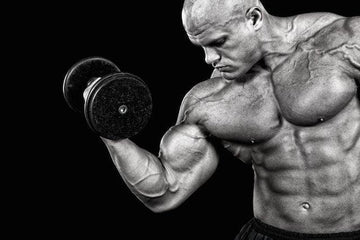

The Ultimate Size and Strength Stack Stack: Juggernaut X and MASSPORT
Table of Contents
When we created Juggernaut X, we wanted to create the best pre-workout on the market, with the maximum dose of ingredients but still make it cost affordable. We did not add any ingredient that was not scientifically proven to enhance performance based on peer-reviewed research.
The original “Juggernaut” pre-workout formula contained BCAA with maltodextrins, in conjunction with creatine, caffeine, beta alanine, arginine, and other performance enhancing ingredients. One of the biggest requests from consumers was to create a carb free version of Juggernaut so that it could be used by people on low carb diets. So when we designed Juggernaut X, we created the pre-workout carb free, but as many people know, insulin spikes from carbohydrates can increase vasodilation and enhance muscle pumps.
Additionally, insulin is a powerful anti-catabolic hormone that has been shown to reduce muscle tissue breakdown. For those lifters who are not dieting and are looking for a great size and strength stack, try combining Juggernaut X and Whey Protein.

Here is a look at the active ingredients in Juggernaut X
Citrulline
L-Citrulline is an amino acid that supports arginine and nitric oxide concentrations, ultimately assisting in the regulation of blood flow and muscular endurance. A new study recently just reported that 8 grams of citrulline a day increases leg performance in experienced weight lifters. Researchers had experienced weight lifters take citrulline before performing submaximal repeated bouts of multiple lower-body resistance exercises would improve performance. The exercise protocol resulted in significant decrease in the number of repetitions in response to exercise.
However, subjects in the citrulline group performed a significantly higher number of repetitions compared with placebo group. In conclusion, results suggest that citrulline supplementation may be beneficial in improving exercise performance during lower-body multiple-bout resistance exercise in advanced resistance-trained men.
Agmatine
Agmatine is a unique supplement capable of providing enormous benefits to anyone looking to improve their mental and physical performance. Agmatine biosynthesis by arginine decarboxylation is well positioned to compete with the principal arginine-dependent pathways, namely: Nitrogen metabolism (urea cycle), polyamine and NO synthesis, as well as protein synthesis. Studies show that agmatine has cardio-protective and supportive benefits through (among other actions) its impact on nitric oxide regulation, neuroprotective benefits through its role as a modulator and supportive agent for neurotransmitters, and cognitive/mood-supporting benefits through its combined influences on nitric oxide synthesis and neurotransmitter modulation.

Creatine
Creatine may also increase muscle mass by reducing myostatin levels. In a study in the Journal of Molecular and Cellular Endocrinology, researchers examined how creatine impacted myostatin levels in resistance-trained men. In a double-blind design, 27 healthy male subjects were assigned to resistance training and creatine supplementation groups.
Amazingly, the study found that creatine supplementation added to a resistance-training program amplifies the training-induced decrease in serum levels of myostatin, increasing the effects of exercise on muscle strength and mass. Other studies have reported that ingestion of creatine enhances muscle IGF-1 responses as well in conjunction with increasing satellite cell activation.
Beta-Alanine
Beta-alanine is an amino acid that, with the help of another amino acid called histidine, helps form a compound called carnosine in muscle. Carnosine, in turn, is one of the most powerful pH (acid) buffers known to operate in muscle during intense exercise. Over the past fourteen years, research from five countries (Japan, the United Kingdom, Korea, Russia, and the United States) has been accumulating on the potential benefits of beta-alanine supplementation in humans. To put it simply, if high-intensity workouts are your thing, beta-alanine will help you reach new levels of performance.
For example, a placebo-controlled double-blind study of 33 men was recently undertaken at The College of New Jersey. After being placed into a creatine only (10.5 grams/day), creatine + beta alanine (10.5 grams creatine + 3.2 grams/day beta alanine), or placebo (10.5 grams/day of dextrose) group, subjects underwent 10-weeks of resistance training. Researchers reported that subjects in the creatine + beta-alanine group gained significantly more lean mass (~ 4 lbs.) and lost more body fat than subjects in the other two groups. Also, fatigue rates during training were lowest, and training volume was highest, respectively, in the creatine + beta-alanine group.
Caffeine
Caffeine has also been found to increases repetitions to fatigue during resistance exercise. Researchers examined the impact of acute caffeine ingestion on perceptions of muscle pain following a bout of high-intensity, upper-body resistance exercise to failure. Moderately trained males ingested a dose of caffeine (5 mg · kg-1) or placebo in a randomized and counterbalanced order and 1 hour later completed bench press exercise to failure at an intensity of 60% 1 repetition maximum.
At the end of the study, caffeine resulted in improved repetitions to failure, greater peak blood lactate, and lower RPE compared to placebo. Muscle pain perception was also significantly lower in the caffeine condition compared to placebo. Caffeine increased reps to failure by an average of 11.6% on the bench press and 19.1% on the leg press. The results suggest that caffeine ingestion enhances muscular strength performance and reduces upper body muscle pain perception immediately following a bout of high-intensity resistance exercise to failure.
Tyrosine
The amino acid tyrosine is the precursor to the catecholamine neurotransmitters dopamine and norepinephrine. In fact, the hydroxylation of tyrosine by the enzyme tyrosine hydroxylase is the rate-limiting step in the synthesis of the catecholamines. Increasing tyrosine uptake may positively influence catecholamine-related psychological functioning. This amino acid has been administered to depressed patients to improve their mood, but although catecholamine production was enhanced, the treatment did not elevate mood.
There is evidence that tyrosine may benefit healthy individuals exposed to demanding situational conditions. Some have suggested that inadequate production of these hormones or transmitters could compromise optimal physical performance. For example, tyrosine administration appears to improve cognition and performance in soldiers under stressful conditions.

















